pep小学五年级下册英语语法知识点全册共15页word资料
PEP五年级下册英语知识点整理
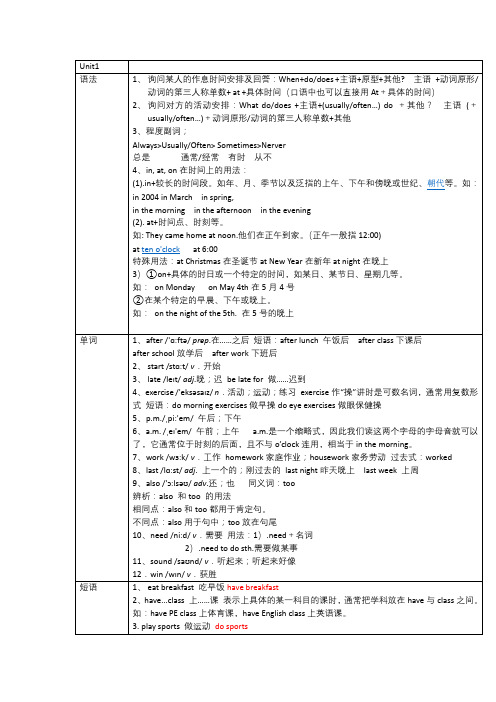
11、sound /saʊnd/v.听起来;听起来好像
12.win /wɪn/v.获胜
短语
1、eat breakfast吃早饭have breakfast
2、have...class上……课表示上具体的某一科目的课时,通常把学科放在have与class之间。如:have PE class上体育课,have English class上英语课。
on vacation度假同义词:holiday
4、lovely /lʌvli/adj.可爱的;美丽的
5、leaf /liːf/n.叶子复数:把leaf中的f变v,再加es,即leaves。
6、fall /fɔːl/v.落下n.秋天在美式英语中多用fall表示“秋天”,而英式英语
fall behind落后fall down落下
2、spring /sprɪŋ/n.春天在某个季节用介词in
summer /'sʌmə/n.夏天、跌势
autumn /'ɔːtəm/n.秋天in autumn在秋天early autumn初秋同义词:fall
winter /'wɪntə(r)/n.冬天
3.vacation /və'keɪʃn/n.假期summer vacation暑假winter vacation寒假
2、询问喜欢某个季节的原因:Why?/ Why do/does主语like、、、best?
Because….
because /bɪ'kɔːz/conj.因为用来连接表示因果关系的句子,后面跟表示原因的句子。
because of因为;由于+名词
ቤተ መጻሕፍቲ ባይዱ单词
最新PEP人教版小学英语五年级下册单元知识清单总结(全册)
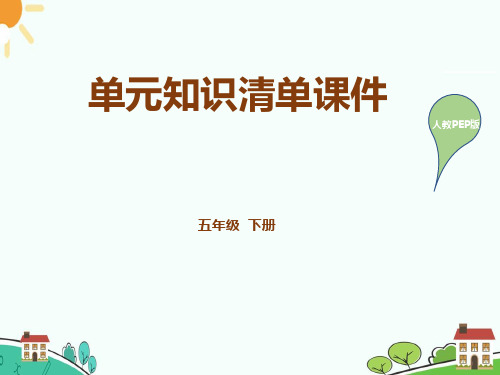
英语 人教PEP版 五年级下册 Unit 1
【重点释疑】 ☆此句型是由why引导的特殊疑问句。why用来
询问事情的原因,意为“为什么”。 ☆其答语用because来陈述原因。because意为
“因为”。例如: —Why do you lBecause I can swim in the river. 因为我可以在河里游泳。
秋天。/我最喜欢秋天。 ☆“What’s your favourite season?”也可以用 来询问对方最喜欢的季节是什么。可用“My favourite season is+季节.”来回答,也可直接用 所喜欢的季节名称回答。
英语 人教PEP版 五年级下册 Unit 1
例如: —What’s your favourite season?
英语 人教PEP版 五年级下册 Unit 1
☆此句型还可以用来询问最喜欢别的事物的原 因,如科目、食品、动物等。当主语是第三人称单 数时,应将其中的do改为does。
英语 人教PEP版 五年级下册 Unit 1
【情景再现】 课堂上,格林老师在进行一项调查,调查孩子
们最喜欢的季节及其原因。我们看看她是怎么问 约翰的吧! Miss Green:What’s your favourite season? John:Summer. Miss Green:Why do you like summer? John:Because I can swim.
你最喜欢什么季节? —My favourite season is winter. /Winter.
我最喜欢的季节是冬季。/冬季。
英语 人教PEP版 五年级下册 Unit 1
2.【原文呈现】 Why do you like spring best? 你为什么最喜欢春季? 【句型结构】 “Why do you like +季节+best?” 用来询问对方最喜欢某个季节的原因。
人教版PEP五年级下册英语知识点复习总结讲解学习

五年级英语下册知识点复习总结Unit1My day1.询问对方何时做某事的句型When do you+动词(短语)原形+其他?(表示事件)I(+频度副词)+动词(短语)原形+at+时间点。
注意:询问第三人称单数人称何时做某事的时候应将do改为does,其答语的主语为第三人称单数,动词部分应变为第三人称单数形式。
(以下情况同样需注意此项)如:When does he get up?He gets up at6:00 a.m.译:他什么时候起床?他在上午六点起床。
2.询问对方周末做什么的句型What do you do on the weekend?Saturdays.I(+频度副词)+动词(短语)原形+with sb(人)+on Sundays.the weekend. 3.play的用法体育运动:直接将运动项目,play basketball Play乐器:先加the再加乐器,play the piano电脑:play on the computer4.like的用法名词(n):喜欢某人或某物like to do sth:喜欢做某事(着重于某一次喜欢)doing sth:喜欢做某事(着重于日常习惯爱好)例:I like reading,but I do not like to read this evening.译:我喜欢读书,但是今晚我不喜欢读书。
5.be good…的区别at擅长be good to对…好for有益于6.动词变第三人称单数的变化规则1)一般情况下,动词后面直接加-s;例如work-works live-lives play-plays sing-sings把y变为i再加-es;2)以辅音字母+y结尾的动词精品资料》》》》》例如study-studies try-tries carry-carries fly-flies cry-cries 注意:play-plays因为a是元音3)以ch,sh,s,x或o结尾的动词,在后面加-es;例如teach-teaches wash-washes do-does go-goes fix-fixes4)不规则的;例如have-hasUnit2My favourite season1.询问对方最喜欢的季节的句型Which season do you like best?I like+某个季节+best./某个季节.或:What is your favourite season?My favourite season is+季节.====季节is my favourite season.2.询问对方最喜欢某个季节的原因的句型Why do you like+季节+best?/Why?like(查询like的使用方法).如:I like eating ice cream.Because Ican+动词原形.如:I can swim.3.询问天气的句型What is the weather like+其他?How is the weather+其他?如:What is the weather like in Beijing in spring?等同于:How is the weather in Beijing in spring?精品资料》》》》》译:北京春天的天气怎么样?4.特殊疑问词的区分where:哪里(问地点)why:为什么(问原因,回答用Because) what:什么(问具体内容)when:什么时候(问时间)which:哪个(问哪一个)whose:谁的(回答用It is..These/Those are等)Unit3My school calendar1.询问节日在什么时候的句型When+is+节日名称?节日名称in+月份.isIt on+具体某一天.2.询问某个节日时对方将要(为别人)做什么的句型What will you do(for sb)+on+节日名称?I/We will+动词(短语)原形+(for sb)+on+节日名称.3.will的用法will表示将来时,表示这件事现在还没有发生,但是会发生在未来。
PEP五年级下课文语法与知识点总复习
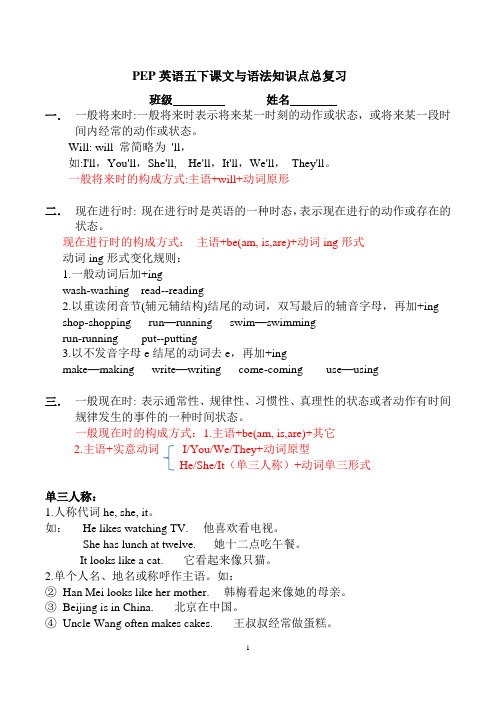
PEP英语五下课文与语法知识点总复习班级姓名一.一般将来时:一般将来时表示将来某一时刻的动作或状态,或将来某一段时间内经常的动作或状态。
Will: will 常简略为'll,如:I'll,You'll,She'll, He'll,It'll,We'll,They'll。
一般将来时的构成方式:主语+will+动词原形二.现在进行时:现在进行时是英语的一种时态,表示现在进行的动作或存在的状态。
现在进行时的构成方式:主语+be(am, is,are)+动词ing形式动词ing形式变化规则:1.一般动词后加+ingwash-washing read--reading2.以重读闭音节(辅元辅结构)结尾的动词,双写最后的辅音字母,再加+ingshop-shopping run—running swim—swimmingrun-running put--putting3.以不发音字母e结尾的动词去e,再加+ingmake—making write—writing come-coming use—using三.一般现在时:表示通常性、规律性、习惯性、真理性的状态或者动作有时间规律发生的事件的一种时间状态。
一般现在时的构成方式:1.主语+be(am, is,are)+其它2.主语+实意动词I/You/We/They+动词原型He/She/It(单三人称)+动词单三形式单三人称:1.人称代词he, she, it。
如: He likes watching TV. 他喜欢看电视。
She has lunch at twelve. 她十二点吃午餐。
It looks like a cat. 它看起来像只猫。
2.单个人名、地名或称呼作主语。
如:② Han Mei looks like her mother. 韩梅看起来像她的母亲。
③ Beijing is in China. 北京在中国。
新PEP小学英语五年级下册期末复习语法知识点专题.
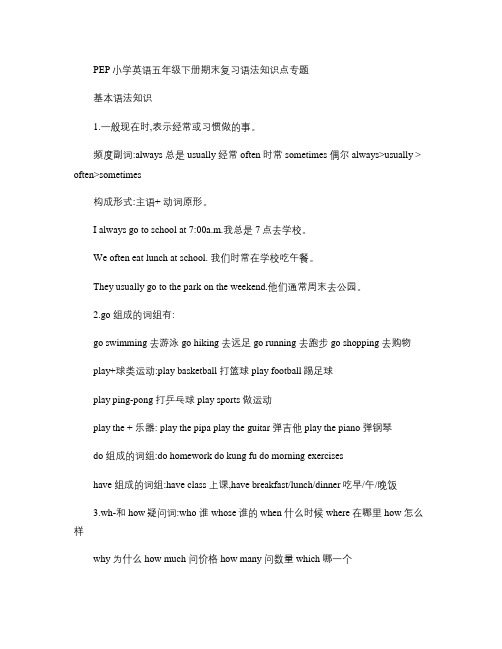
PEP小学英语五年级下册期末复习语法知识点专题基本语法知识1.一般现在时,表示经常或习惯做的事。
频度副词:always 总是usually 经常often 时常sometimes 偶尔always>usually > often>sometimes构成形式:主语+ 动词原形。
I always go to school at 7:00a.m.我总是7点去学校。
We often eat lunch at school. 我们时常在学校吃午餐。
They usually go to the park on the weekend.他们通常周末去公园。
2.go 组成的词组有:go swimming 去游泳go hiking 去远足go running 去跑步go shopping 去购物play+球类运动:play basketball 打篮球play football踢足球play ping-pong 打乒乓球play sports 做运动play the + 乐器: play the pipa play the guitar 弹吉他play the piano 弹钢琴do 组成的词组:do homework do kung fu do morning exerciseshave 组成的词组:have class 上课,have breakfast/lunch/dinner吃早/午/晚饭3.wh-和how疑问词:who 谁whose谁的when 什么时候where 在哪里how 怎么样why 为什么how much 问价格how many 问数量which 哪一个4.表示在星期几用on ,如on Monday. 表示在具体某一天用on. 如on March 1st表示在几月份用in ,如in March. 表示在一天中的上午下午晚上用in. in the morning 在早上, in the afternoon 在下午,in the evening 在傍晚。
人教版PEP五年级英语下册各单元知识点

PEP五年级英语下册各单元知识点Unit1My day一、重点词汇。
1.四会词汇:eat breakfast吃早饭have···class上······课play sports进行体育运动exercise活动;运动domorning exercises做早操eat dinner吃晚饭clean my room打扫我的房间go for a walk散步go shopping去买东西;购物take学习;上(课)dancing跳舞;舞蹈take a dancing class上舞蹈课2.三会词汇:when什么时候after在(时间)后start开始usually通常地;惯常地Spain西班牙late晚;迟 a.m.午前;上午p.m.午后;下午why为什么shop去买东西;购物work工作last上一个的;刚过去的sound听起来好像also还;也busy忙的need需要play戏剧;剧本letter信live居住island岛always总是;一直cave山洞;洞穴go swimming去游泳win获胜二、其他日常活动。
get up起床eat lunch吃午饭go to bed上床睡觉wash my face洗脸wash my clothes洗我的衣服watch TV看电视play ping-pong打乒乓球playthe pipa弹琵琶go swimming去游泳go running去跑步do homework做作业do kung fu练武术play football踢足球play basketball打篮球三、频度副词。
always总是,一直(100%)usually通常(80%)often经常(60%)sometimes(30%)有时四、疑问词。
when什么时候why为什么五、重点句型。
1、询问别人什么时候做某事的句型及回答。
(完整)PEP小学英语五年级下册各单元知识重点归纳-推荐文档

PEP五年级下册各单元知识重点Unit 1 This Is My Day我会背:do morning exercises晨练eat breakfast吃早饭have english class上英语课play sports进行体育运动eat dinner吃晚饭when什么时候evening夜晚;晚上get up起床at在……点钟usually通常;一般noon中午climb mountains爬山go shopping购物;买东西play the piano弹钢琴visit grandparents看望祖父母go hiking去远足weekend周末often经常sometimes有时候话题: 日常生活1. When do you do morning exercises? 你什么时候做早操?.usuall.d.mornin.exercise.a.8:00......我经常八点钟做早操。
(.usuall.ge.u.a.12:0.noo........我经常在中午十二点起床。
)2. When do you eat dinner ? 你什么时候吃晚餐?.ea.dinne.a.7:0.i.th.evening........我在晚上七点钟吃晚餐。
3.Wha.d.yo.d.o.th.weeken......... 你周末做什么?.usuall.clim.mountains. 我通常去爬山. .ofte.pla.sport..我经常经行体育锻炼。
Sometime..pla.th.pian..有时候我弹钢琴。
Unit 2 My Favourite Season我会背:spring春天summer夏天fall秋天winter冬天season季节which哪一个best最;极swim游泳fly kites放风筝skate滑冰make a snowman堆雪人plant trees种树why为什么because因为sleep睡觉favourite 最喜爱的话题: 季节1. Which season do you like best ? I like spring best.(Spring.)你最喜欢是什么季节?我最喜欢春季。
PEP小学五年级英语下册语法讲解

PEP小学五年级英语下册语法讲解语法是英语的灵魂,是把单词串联起来的一条线。
小编在这里整理了相关知识,快乐看看吧!PEP小学五年级英语下册语法讲解现在进行时一.意义——当表示现在正在进行的动作或正在发生的事。
二.构成:be (am, is ,are )+动词现在分词-ing形式标志性词语:1.现在进行时.通常用“now”.eg: I am doing my homework now.2.现在进行时.通常用“look”.eg: Look! My mother is running3.现在进行时.通常用“listen”.eg: Listen! They are reading.4.现在进行时.通常用“at the (this) moment”eg: At the (this) moment, he is only weeping.三、现在进行时的句型变化• 肯定式结构:主语+be+动词-ing形式+其他.例如:We are running now.• 否定式结构:主语+be+not+动词-ing形式+其他.例如:They aren’t doing their homework.• 一般疑问句式结构:Be+主语+动词-ing形式+其他?例如:Is she having English lesson?回答:肯定Yes, she is. 否定:No, she isn’t.• 特殊疑问句式结构:疑问词+be+主语+其他?例如:What is he doing now?回答:He is swimming.四. 现在分词的构成:(1)一般在动词末尾直接加ing,1 一般情况下直接加ingthink---thinking sleep---sleeping study---studying speak---speaking say---saying(2)以不发音字母e结尾的动词,先去掉e,再加ing,如skate →skating make →making dance → dancing write → writing have→ having ride → riding come → coming(3)以重读闭音节结尾的动词,中间只有一个元音字母,词尾只有一个辅音字母,应双写末尾的辅音字母,再加ing, 如:putting running beginning stopping swimming shopping jogging sitting getting forgetting letting(4)以ie结尾的动词,把ie改为y ,再加ingdie---dying lie---lying五、现在进行时的用法(1)用来表示说话时正在进行或者发生的动作,例如:Mother is cooking in the kitchen.妈妈在厨房里煮饭。
(完整版)pep小学五年级英语下册知识点及语法整理期末最全复习资料(打印版)
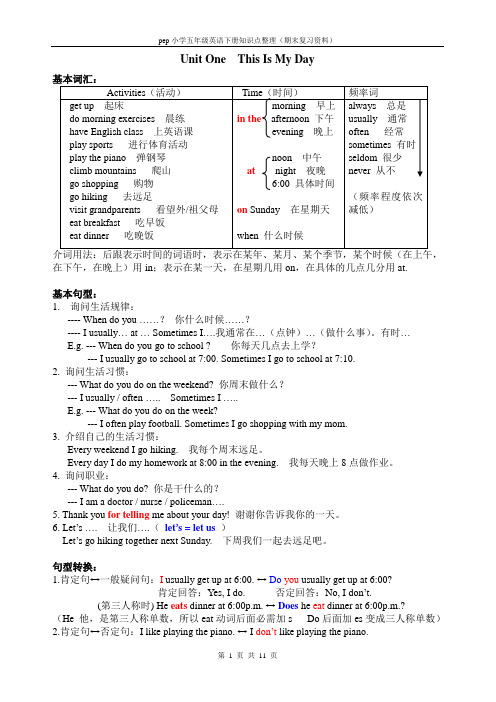
Unit One This Is My Day在下午,在晚上)用in;表示在某一天,在星期几用on,在具体的几点几分用at.基本句型:1. 询问生活规律:---- When do you ……?你什么时候……?---- I usually… at … Sometimes I….我通常在…(点钟)…(做什么事)。
有时…E.g. --- When do you go to school ? 你每天几点去上学?--- I usually go to school at 7:00. Sometimes I go to school at 7:10.2. 询问生活习惯:--- What do you do on the weekend? 你周末做什么?--- I usually / often ….. Sometimes I …..E.g. --- What do you do on the week?--- I often play football. Sometimes I go shopping with my mom.3. 介绍自己的生活习惯:Every weekend I go hiking. 我每个周末远足。
Every day I do my homework at 8:00 in the evening. 我每天晚上8点做作业。
4. 询问职业:--- What do you do? 你是干什么的?--- I am a doctor / nurse / policeman….5. Thank you for telling me about your day! 谢谢你告诉我你的一天。
6. Let’s …. 让我们….(let’s = let us)Let’s go hiking together next Sunday. 下周我们一起去远足吧。
句型转换:1.肯定句↔一般疑问句:I usually get up at 6:00. ↔Do you usually get up at 6:00?肯定回答:Yes, I do. 否定回答:No, I don’t.(第三人称时) He eats dinner at 6:00p.m.↔Does he eat dinner at 6:00p.m.?(He 他,是第三人称单数,所以eat动词后面必需加s Do后面加es变成三人称单数)2.肯定句↔否定句:I like playing the piano.↔ I don’t like playing the piano.I can play the piano. ↔ I can’t play the piano.3.划线提问:⑴I often go shopping on the weekend. →When do you go shopping ?⑵I often go shopping on the weekend. →What do you do on the weekend?⑶I am a student. →What are you?⑷I go to school at 7:00. →When do you go to school?知识延伸:⑴同义词:play sports = do sportseat breakfast/ lunch/ dinner = have breakfast/ lunch/ dinner⑵同义句:What do you do? = What are you? 你是干什么的?⑶一般将来时:(be going to)The weather report says it is going to rain tomorrow. 天气预报说明天将要下雨。
PEP小学五年级下册英语知识点总结-全册(最新最全)

PEP小学五年级下册英语知识点总结全册第一单元知识点一、主要单词:do morning exercises 晨练,做早操eat breakfast 吃早饭have English class _h英语课play sports 进行体育活动eat dinner 吃晚饭eat lunch 吃午饭climb mountains 爬山go shopping购物,买东西play the piano弹钢琴visitgrandparents 看望〔外〕祖父母二、主要句子:When do you eat dinner?你什么时候吃晚饭?I eat dinner at 7:00 in the evening.我晚上七点吃晚饭。
When do you get up?你什么时候起床?I usually get up at 12: 00 at noon.我通常在中午12 点起床。
What do you do on the weekend?你在周末干什么?Usually I watch TV and go shopping.我通常看电视和购物。
Sometimes I visit my grandparents.有时候我去看望我的外祖父母。
三、同义词eat breakfast一have breakfast eat lunch——have lunch eat dinner一have dinner play sports一do sportsusually一often复数形式:policeman一po 1 icemen po 1 icewoman一po 1 icewomen 现在分词:tell一telling三单:say一says同义句:What do you do ? -- What are you?你是干什么的?四、表示频度的副词:always总是,一直usually 通常,常常often 经常sometimes 有时候五、以复数形式出现的词组:visit grandparents plant trees六、介词后跟表示时间的词语时,表示在某年、某月、某个季节,某个时候用in;表示在某一天,在星期几用on,在具体的几点几分用at.第二单元知识点一、主要单词:season 季节spring 春天summer 夏天fall 冬天winter冬天swim游泳fly kites 放风筝skate滑冰make a snowman 堆雪人主要句子:Which season do you like best?你最喜欢哪个季节?I like winter best.我最喜欢冬天。
最新PEP人教版小学英语五年级下册单元知识清单总结(全册)

五、第八、第九、 第十二变化不规则外,其 余均在基数词后加上-th即可。 ② 20~90的序数词的构成方法是将基数词的词 尾 -y 变成i再加-eth. ③ 几十几的序数词,只需把个位数变成序数词, 十位数不变。
英语 人教PEP版 五年级下册 Unit 1
英语 人教PEP版 五年级下册 Unit 1
例如: —When does he do sports?
他什么时候做运动? —He usually plays sports after school.
他通常放学后做运动。 ☆询问时间的其他句型: What time+do/does+主语+动词原形+其他? 例如:What time do you read English?
单元知识清单课件
人教PEP版
五年级 下册
英语 人教PEP版 五年级下册 Unit 1
Unit 1 单元重难点
1.【原文呈现】 When do you finish class in the morning? 你们上午的课到几点结束? 【句型结构】 “When+助动词+sb+动词原形+其他?” 用来询问某(些)人做某事的时间。
—I usually climb mountains. 我通常爬山。
英语 人教PEP版 五年级下册 Unit 1
【情景再现】 每个人都有自己的周末安排。来看一下Mike和
Amy的周末计划吧! Mike:Hello, Amy! What do you do on the weekend? Amy:I usually play the piano. Mike:Oh, that’s good. When do you usually play
人教版PEP小学英语五年级下册知识点归纳总结
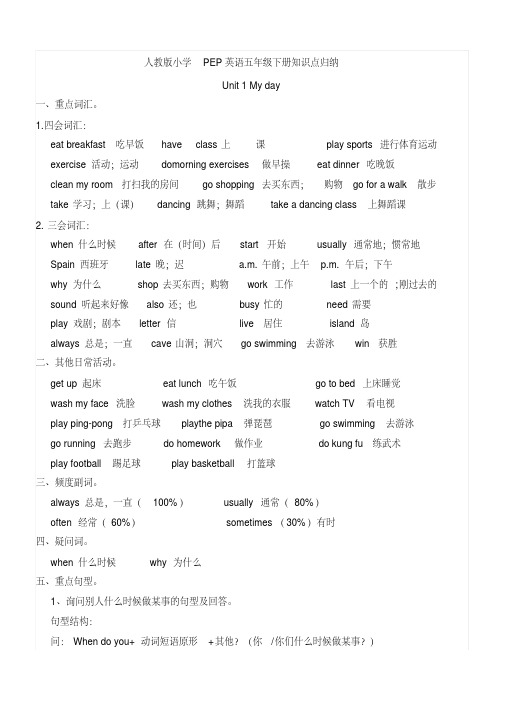
人教版小学PEP英语五年级下册知识点归纳Unit 1 My day一、重点词汇。
1.四会词汇:eat breakfast 吃早饭 have··class 上······课play sports 进行体育运动exercise 活动;运动 domorning exercises做早操eat dinner吃晚饭clean my room 打扫我的房间go shopping 去买东西;购物go for a walk 散步take学习;上(课) dancing跳舞;舞蹈 take a dancing class 上舞蹈课2. 三会词汇:when什么时候after 在(时间)后start 开始usually 通常地;惯常地Spain 西班牙late 晚;迟 a.m. 午前;上午 p.m. 午后;下午why 为什么shop 去买东西;购物work 工作last 上一个的;刚过去的sound 听起来好像also 还;也busy 忙的 need 需要play 戏剧;剧本letter 信live 居住island 岛always 总是;一直cave 山洞;洞穴go swimming 去游泳 win 获胜二、其他日常活动。
get up起床 eat lunch吃午饭 go to bed 上床睡觉wash my face洗脸 wash my clothes 洗我的衣服 watch TV看电视play ping-pong打乒乓球 playthe pipa弹琵琶 go swimming去游泳go running去跑步 do homework 做作业 do kung fu练武术play football踢足球 play basketball打篮球三、频度副词。
always总是,一直(100%) usually通常(80%)often 经常(60%) sometimes(30%)有时四、疑问词。
PEP小学五年级下册英语知识点总结-全册(最新最全)

PEP小学五年级下册英语知识点总结-全册(最新最全)PEP小学五年级下册英语知识点总结全册Unit 1: Daily RoutinesIn this unit。
we learn some main words and XXX。
Some of the main words are: do morning exercises。
eat breakfast。
have English class。
play sports。
eat dinner。
climb mountains。
go shopping。
play the piano。
visit grandparents。
and go hiking。
For example。
when we want to ask someone when they eat dinner。
we can say "When do you eat dinner?" and the answer can be "I eat dinner at 7:00 in the evening." Similarly。
we can ask "When do you get up?" and the answer can be "I usually get up at 12:00 at noon." We can also use some synonyms like have breakfast instead of eat breakfast。
have lunch instead of eat lunch。
and have dinner instead of eat dinner。
We can also use do sports instead of play sports。
and often instead of usually.Unit 2: Seasons and ActivitiesIn this unit。
五年级下英语知识点归纳重点语法人教PEP

重点语法A) 一般现在时1. 概念:一般现在时表示经常的、习惯性的动作或存在的状态。
2. 构成:一般现在时的构成主要有两种形式:(1)be型:句子的谓语动词只有be(am,is或are):a.肯定句中,只出现be,如:I am a student.我是一名学生。
b.否定句中,要在be后面加not,如:She isn't a teacher.她不是教师。
c.一般疑问句,要将be放在句子开头(注意句首字母大写),句尾用问号,答语用Yes,主语+be.或No,主语+ be + not.如:—Are you ready?—你准备好了吗?—Yes,I am.—是的,我准备好了。
(—No,I'm not.—不,我没准备好。
)(2)实义动词型:句中的谓语动词为实义动词(也叫行为动词):a.肯定句中,只出现实义动词,如:I get up in the morning.我早晨起床。
.否定句中,要在实义动词前面加do(does)+not,do(does)作助动词,本身无意义,常与not缩写成don't(doesn't),如:I don't like vegetables.我不喜欢蔬菜。
c.一般疑问句,要在句子开头加助动词Do(does),句尾用问号,简略答语用Yes,主语+do(does).或No,主语+do(does)+not.如:—Do you like oranges?—你喜欢桔子吗?—Yes,I do.—是的,我喜欢。
(—No,I don't.—不,我不喜欢。
) 3. 一般现在时的用法1) 经常性或习惯性的动作,常与表示频腮度的时间状语连用。
时间状语:every…, sometimes, at…, on Sunday I leave home for school at 7 every morning. 2) 客观真理,客观存在,科学事实。
The earth moves around the sun. Shanghai lies in the east of China.3) 表示格言或警句中。
(完整word版)新版PEP五年级英语下册各单元的知识点,推荐文档

新版PEP五年级英语下册各单元知识点一. 重点词汇。
1. 四会:eat breakfast 吃早饭have …class 上...................... 课play sports 进行体育运动exercise 活动;运动do morni ng exercises 做早操eat dinner 吃晚饭clea n my room 打扫我的房间go for a walk 散步go shopp ing 去买东西;购物take 学习;上(课)dancing 跳舞;舞蹈take a dancing class 上舞蹈课2. 三会:when什么时候after 在(时间)后start 开始usually 通常地;惯常地Spain 西班牙late 晚;迟a.m. 么work 工作sound 午前;上午p.m. 午后;下午shop去头东西;购物why 为什听起来好像also 还;也last 上一个的;刚过去的busy忙的need 需要play 戏剧;剧本letter 信live 居住isla nd岛win 获胜always 总是;一直cave山洞;洞穴go swimmi ng 去游泳二.其他日常活动。
get up起床eat lunch 吃午饭go to bed 上床睡觉wash my face 洗脸wash myclothes 洗我的衣服watch TV 看电视play pin g-p ong 打乒乓球play the pipa 弹琵琶go swimmi ng 去游泳go running 去跑步do homework 做作业do kung fu 练武术play football 踢足球playbasketball打篮球三•频度副词。
always 总是,一直(100% usually 通常(80% often 经常(60% sometimes 有时(30%四. 重点句型。
1. 询问别人什么时候做某事的句型及回答。
pep五年级的下册的英语语法知识点.docx

五年级下册英语语法知识点语法知识1.近义词eat breakfast—have breakfast eat lunch—have lunch eat dinner— have dinnerplay sports— do sports usually— often复数形式: policeman — policemen policewoman — policewomen现在分词:三单: say—says同义句:What do you do ? ---What are you?你是干什么的?tell — telling2、频度的副词:always 总是,一直usually通常,常常often经常sometimes有时候4、介词后跟表示时间的词语时,表示在某年、某月、某个季节,某个时候(在上午,在下午,在晚上)用 in;表示在某一天,在星期几用 on,在具体的几点几分用 at.5、 too 和 either 的用法区别: too 和 either 都是“也”的意思,但 too 用于肯定句, either 用于否定句。
第二单元语法知识1.同义词: autumn(英)— fall (美)对应词: wake up— sleep go to bed— get up2.三单: say— says ask— asks come— comes3.同义句: What ’s your favourite season?(你最喜爱的季节是什么?)----Which season do you like best?( 你最哪个季节?)4.表示天气的介词。
当表示某地某个季节的天气情况时,要把季节放在前面,地点放在后面。
其结构为: What ’ s the weather like in 季节 in 地点?第三单元主要语法点:1、关于月份:( 1)五月写形式是前四个字母加点May , 六月 June, 七月 July ,没有简写形式。
PEP小学五年级英语下册语法讲解
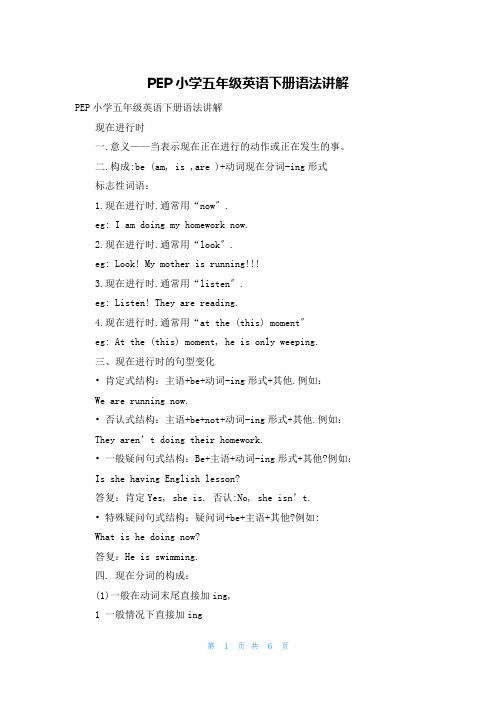
PEP小学五年级英语下册语法讲解PEP小学五年级英语下册语法讲解现在进行时一.意义——当表示现在正在进行的动作或正在发生的事。
二.构成:be (am, is ,are )+动词现在分词-ing形式标志性词语:1.现在进行时.通常用“now〞.eg: I am doing my homework now.2.现在进行时.通常用“look〞.eg: Look! My mother is running3.现在进行时.通常用“listen〞.eg: Listen! They are reading.4.现在进行时.通常用“at the (this) moment〞eg: At the (this) moment, he is only weeping.三、现在进行时的句型变化• 肯定式结构:主语+be+动词-ing形式+其他.例如:We are running now.• 否认式结构:主语+be+not+动词-ing形式+其他.例如:They aren’t doing their homework.• 一般疑问句式结构:Be+主语+动词-ing形式+其他?例如: Is she having English lesson?答复:肯定Yes, she is. 否认:No, she isn’t.• 特殊疑问句式结构:疑问词+be+主语+其他?例如:What is he doing now?答复:He is swimming.四. 现在分词的构成:(1)一般在动词末尾直接加ing,1 一般情况下直接加ingthink---thinking sleep---sleeping study---studying speak---speaking say---saying(2)以不发音字母e结尾的动词,先去掉e,再加ing,如skate →skating make →making dance → dancing write → writing have→ having ride →riding come → coming(3)以重读闭音节结尾的动词,中间只有一个元音字母,词尾只有一个辅音字母,应双写末尾的辅音字母,再加ing, 如: putting running beginning stopping swimming shopping joggingsitting getting forgetting letting(4)以ie结尾的动词,把ie改为y ,再加ingdie---dying lie---lying五、现在进行时的用法(1)用来表示说话时正在进行或者发生的动作,例如:Mother is cooking in the kitchen.妈妈在厨房里煮饭。
五年级英语pep下册语法讲解归纳

五年级英语pep下册语法讲解现在进行时一.意义——当表示现在正在进行的动作或正在发生的事。
二.构成:be (am, is ,are )+动词现在分词-ing形式标志性词语:1.现在进行时.通常用“now”.eg: I am doing my homework now.2.现在进行时.通常用“look”.eg: Look! My mother is running!!!3.现在进行时.通常用“listen”.eg: Listen! They are reading.4.现在进行时.通常用“at the (this) moment”eg: At the (this) moment, he is only weeping.三、现在进行时的句型变化•肯定式结构:主语+be+动词-ing形式+其他.例如:We are running now.•否定式结构:主语+be+not+动词-ing形式+其他.例如:They aren’t doing their homework.•一般疑问句式结构:Be+主语+动词-ing形式+其他?例如:Is she having English lesson?回答:肯定Yes, she is. 否定:No, she isn’t.•特殊疑问句式结构:疑问词+be+主语+其他?例如:What is he doing now?回答:He is swimming.四. 现在分词的构成:(1)一般在动词末尾直接加ing,1 一般情况下直接加ingthink---thinking sleep---sleeping study---studying speak---speakingsay---saying(2)以不发音字母e结尾的动词,先去掉e,再加ing,如skate →skating make →making dance → dancing write → writing have →having ride → riding come → coming(3)以重读闭音节结尾的动词,中间只有一个元音字母,词尾只有一个辅音字母,应双写末尾的辅音字母,再加ing, 如:putting running beginning stopping swimming shopping joggingsitting getting forgetting letting4 以ie结尾的动词,把ie改为y ,再加ingdie---dying lie---lying五、现在进行时的用法(1)用来表示说话时正在进行或者发生的动作,例如:Mother is cooking in the kitchen.妈妈在厨房里煮饭。
- 1、下载文档前请自行甄别文档内容的完整性,平台不提供额外的编辑、内容补充、找答案等附加服务。
- 2、"仅部分预览"的文档,不可在线预览部分如存在完整性等问题,可反馈申请退款(可完整预览的文档不适用该条件!)。
- 3、如文档侵犯您的权益,请联系客服反馈,我们会尽快为您处理(人工客服工作时间:9:00-18:30)。
五年级下册英语语法知识点语法知识1.近义词eat breakfast—have breakfast eat lunch—have lunch eat dinner—have dinnerplay sports—do sports usually—often复数形式:policeman—policemen policewoman—policewomen 现在分词:tell—telling三单:say—says 同义句:What do you do ? ---What are you? 你是干什么的?2、频度的副词:always 总是,一直usually通常,常常often 经常sometimes 有时候4、介词后跟表示时间的词语时,表示在某年、某月、某个季节,某个时候(在上午,在下午,在晚上)用in;表示在某一天,在星期几用on,在具体的几点几分用at.5、too 和either的用法区别:too和either都是“也”的意思,但too用于肯定句,either用于否定句。
第二单元语法知识1.同义词:autumn(英)—fall(美)对应词:wake up—sleep go to bed—get up2.三单:say—says ask—asks come—comes3.同义句:What’s your favourite season?(你最喜爱的季节是什么?)----Which season do you like best?(你最哪个季节?)4.表示天气的介词。
当表示某地某个季节的天气情况时,要把季节放在前面,地点放在后面。
其结构为:What’s the weather like in 季节in 地点?第三单元主要语法点:1、关于月份:(1)五月May , 六月June, 七月July,没有简写形式。
九月September 的简写形式是前四个字母加点Sept. 其他八个月的简写形式是前三个字母加点。
(2)无论是完全形式还是简写形式,表示12个月的单词的第一个字母都要大写。
2、关于基数词变序数词。
(1)一般情况下,直接在基数词后面加th. (one , two , three 除外)。
one—first , two—second , three—third .(2) 以ve结尾的基数词,变ve为f, 再加th. 如:five—fifth , twelve—twelfth.(3)以t结尾的基数词,直接加h。
如eight—eighth.(4) 以不发音的字母e结尾的,丢掉不发音的字母e,再加th. 如nine—ninth.(5) 以y结尾的整十数,在变为序数词时,将y变为ie,再加th. 如twenty—twentieth(6)20以上的两位数,变为序数词时,十位数不变,只将个位上的数变为序数词。
如:twenty-one--—--twenty-first , twenty-two——twenty-second , thirty-four——thirty-fourth(7)序数词的简写形式为表示该词的阿拉伯数字加上该单词的最后两个字母,最后两个字母要变成上标格式。
如:first—1st , second—2nd , third—3rd , fourth—4th . twentieth—20th3. 回答When is your birthday?这个问题,如果只说明生日在几月份,在月份前用in.如 My birthday is in July. 如果要具体说明生日是在几月几日,则要把in去掉,直接用is,或者在is后加on。
如My birthday is June 9th. 或My birthday is on June 9th .4.注意区分两个句子:What day is it today ?今天星期几?What’s the date today? 今天是几月几日?5. 根据要求写单词:make (现在分词)---making. send( 现在分词)---sending.6.句子:How many birthdays are in October ?有几个人的生日在十月? There are 3.7. My birthday is in February .(变为一般疑问句)---Is your birthday in February?8. Does she have a computer? 她有计算机吗?当第三人称单数和句子中出现了does时,其他动词必须使用原型。
9、读序数词时,前面一定要加the. 如 October 1st .读作October the first.10、同义句:Who has a birthday in October?===Whose birthday is in October?第四单元知识点:1、在电话中介绍自己时,可以用“It’s …”或者‘This is ….’。
但是不能用“I am …”或者“My name is …”2.在电话中表另一个人接电话时,应该说:“Can I speak to …?”3、告诉别人接电话时,说:There is a call for you.4、在接电话时请别人稍候说:Hold on please.或者Please hold on.5、动词变为现在分词(加ing)的规则:(1)一般情况下,在动词的后面直接加ing. 如:play—playingclean—cleaning draw—drawing cook—cooking(2) 以单个不发音的字母e结尾的动词,去掉不发音的字母e,再加ing .如:write—writing come—coming take—taking make—making leave—leaving have—having(3) 以重读闭音世结尾的动词,如果词尾只有一个辅音字母,则要先双写这个辅音字母,再加ing. 如: run—running swim—swimming put—putting sit—sitting set—setting 五单元主要知识点:1、在英语中,当表示妈妈时,无论是人类妈妈还是动植物的妈妈,都可以用she . 而表示婴儿时,也都可以用it.2、系动词be 的用法:我是am你是are, is跟着他她它。
如果人称是复数,扑面一律都用are.如:I am reading a book. He is cooking dinner.We are doing an experiment. Are you eating lunch?3、With 除了表示和…一起外,还可以表示“使用”,如:That elephant is drinking water with its trunk.大象正在用它的象鼻喝水。
I am writing with my pen.我正在用我的钢笔写字。
4、当句子中出现了can时,动词一定要用原形。
如:Can tigers really swim? I can wash the clothes.我会洗衣服。
I am washing clothes.我正在洗衣服。
5、can , usually , often , sometimes , always 这几个单词都是一般现在时的好朋友,当句子中出现了它们时,动词一般都要用原形。
now, am , is , are 这几个单词都是现在进行时的好朋友,当句子中出现了它们时,动词要用现在分词形式,也就是ing形式。
第六单元主要知识点:1、现在进行时的句子变一般疑问句时,只要将系动词be(am is are )和主语交换位置,将句末的句号变为问号,但是要注意第一人称和第二人称时,人称和系动词的相应变化。
如:I am reading a book? ------Are you reading a book?You’re walking . -----Am I waling? He is cooking dinner . -------Is he cooking dinner?2、表示用什么做个实验时,要用on。
如 Do an experiment on me , please.3. It’s time to 后跟动词的原形,It’s time for 后跟名词。
如:It’s time to go to school. 该去上学了。
(到了去上学的时间了。
)It’s time for English class.到英语课的时间了。
It’s time to have English class. 该上英语课了。
英语下册知识点总结二、重点短语讲解1. play with 和…一起玩 play with sb.(某人) 和…一起玩play with sth.(某物) 玩某物e.g. Lucy and Lily are playing with their mother. Lucy and Lily are playing with their doll.2. a lot of 很多 a lot of = lots of + 可数名词复数或不可数名词e.g. 同义句转换 There are a lot of apples on the table.=There are ______ ______ apples on the table. (答案:lots of)3. how often 多久一次how often 是一个特殊疑问词,就频率提问。
英语表示频率的词:一次:once两次:twice 特殊其他次数:基数词+times 构成例如:8次 eight timese.g. --How often do you go to the library?--I go to the library once a week. (注:如就划线部分提问,应用特殊疑问词how often)4. how many 多少how many/much 就数量提问 how many + 可数名词;how much + 不可数名词e.g.-- How many boys are there in your class? -- There are40 boys in my class.-- How much water is there in the bottle? - There isa little water in the bottle.5. be good at 擅长 at 后可加名词如加动词,动词应用动名词形式既 v + inge.g. I am good at English.6. be interested in 对…感兴趣in 后可加名词如加动词,动词应用动名词形式既 v + inge.g. I am interested in English.7. play the violin 拉小提琴乐器前加定冠词 the8. listen to music 听音乐听…,用listen to(1). 听音乐前,不加定冠词the (2). 听收音机前,要加定冠词the : listen to the radio9. come from 来自,come from = be from, I come from China. =I am from China.易错点:Where are you come from? (错误) Where do you come from? (正确)10. play football 踢足球 {球类名词前不加冠词} 11.be famous for 因…闻名12. have a look at 看一看 have a look at = look at13. how much 多少(钱)how much 用来询问价格14. a pair of 一双;一对 a pair of glasses; a pair of trousers;a pair of gloves15. try on 试穿试穿鞋子 try on the shoes = try the shoes on试穿它此处它是代词,只能放在 try on 之间 try it on14. see a doctor 看医生常用表示“看”的单词有:watch; see; look; read .watch: 用于看电视,比赛等; watch TV watch football matchsee: 看见强调结果,看到什么;看医生、看电影时用see ; see a film; see a doctor15. take good care of 好好照顾 take (good) care of = look after16. have a fever 发烧have a + 表示症状的单词 have a fever; have a toothache; have a headachehave + 病名 have measles (麻疹) have mumps (腮腺炎)17. have to 不得不Her mother is ill, she has to look after her mother, so she can’t come to the party.重点:含有have to 的句子变否定用don’t 或doesn’te.g. She has to finish her homework..She doesn’t have to finish her h omework. (正确) She has not to finish her homework.(错误)18. be worried about 担心 She is worried about her exam.19.help … with 帮助…做某事help …with = help sb. (to) do sth.Peter helps her mother with the housework. = Peter helps her mother (to) do the housework.三、重点单词用法1. call v. 称作 What do you call it in English?2. like v. 喜欢sth. I like English very muchlike to do sth. I like reading very much, but I don’t like to read now.doing sth.3. let’s + 动词原形Let’s (=let us) make animals. let sb. do sth. 让某人做某事4. want v. 想,想要want sth. I want a piece of paper.to do sth. I want to watch TV.5. 情态动词情态动词很简单,没有人称数之变,动词原形后边站,can表能力 may 许可 should应该 would愿 must必须,否定needn’t换 have to不得不表客观四、重点语法A) 一般现在时1. 概念:一般现在时表示经常的、习惯性的动作或存在的状态。
